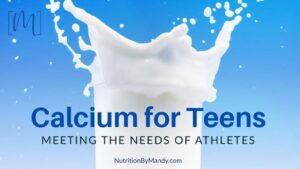Last Updated on April 2, 2025 by Mandy Tyler, M.Ed., RD, CSSD, LD
Exploring the Benefits of Caffeine for Sports Performance
Curious about the benefits of caffeine for sports performance? As a sports dietitian, I am frequently asked if athletes should take caffeine to enhance their performance.
Let’s dive into what the research has to say about caffeine for athletes and potential benefits for sports performance.
What is Caffeine?
Caffeine is a naturally occurring compound found in a variety of plant species, including coffee, cocoa, and tea (1, 2).
In addition, to naturally occurring sources, caffeine is commonly added to soda, energy drinks, gum, gels, bars, and other food products (1).
Caffeine is recognized as being the most commonly consumed psychoactive stimulant in the world. In addition, it is one of the most popular ergogenic aids used by athletes (1, 2).

What are the Benefits of Caffeine for Sports Performance?
The primary action of caffeine in the body is as a central nervous system stimulant. Athletes may take caffeine prior to exercise for a variety of reasons, including to help increase alertness, reduce feelings of perceived effort, or to assist with competing at a higher intensity (3).
Research in athletes has shown potential positive benefits of caffeine on a variety of aspects of sports performance. These include (2):
- Aerobic endurance
- Muscular strength and endurance
- Sprinting
- Jumping
- Throwing
- Cognitive performance
How Much Caffeine is Beneficial for Sports Performance?
Caffeine recommendations for sports performance are based upon the athlete’s body weight. In the hour before exercise, it is generally recommended that athletes consume 3-6 mg of caffeine per kg of body weight (2).
Consuming caffeine 60 minutes prior to activity allows time for caffeine to peak in the bloodstream at the start of activity (2).
For a 150-pound athlete, 3-6 mg/kg body weight would be ~200-400 mg of caffeine.
Caffeine Content of Common Beverages
To provide a point of reference, the table below provides the caffeine contents of several popular beverages (4).
| Product | Amount | Caffeine Content |
| Starbucks Coffee, Pike Place Roast | 16 oz | 310 mg |
| Starbucks Espresso | 1.5 oz | 150 mg |
| Folgers Classic Roast | 12 oz (2 Tbsp) | 120-160 mg |
| Lipton Black Tea | 1 bag | 55 mg |
| Coca-Cola | 12 oz | 34 mg |
| Diet Coke | 12 oz | 46 mg |
| Mountain Dew | 12 oz | 54 mg |
| Celsius Energy Drink | 12 oz | 200 mg |
| Red Bull | 8.4 oz | 80 mg |
If you are interested in the caffeine content of other common beverages, the Center for Science in the Public Interest has an excellent caffeine chart available on their website.
What About Caffeinated Gum for Sports Performance?
The use of caffeinated gum has started rising in popularity in the sport setting. Caffeinated gum is a quick and convenient way for athletes to consume caffeine prior to or during an event.
The amount of caffeine in caffeinated chewing gum varies by brand, typically ranging between 50-100 mg per piece of gum.
Research looking at the use of caffeinated chewing gum has shown that it is absorbed by the body faster than caffeine that is ingested in a beverage or capsule form. When the gum is chewed, absorption begins in the mouth, which leads to a faster effect in the body (2, 5, 6).
Thus, when using caffeinated gum to enhance performance, athletes would want to chew the gum closer to the start of the event. Instead of 60 minutes, it is generally recommended for caffeinated chewing gum to be used ~15 minutes prior to the start of the activity (2, 5, 6).
Are there Concerns with Too Much Caffeine for Athletes?
It is important for athletes to be aware that while some caffeine may be beneficial for sports performance, too much may lead to negative side effects.
High doses of caffeine (≥9 mg/kg body weight) can increase an athlete’s risk of undesired side effects, such as jitters, anxiety, and nausea (2, 3).
The higher doses of caffeine are not associated with an increased performance benefit (2, 3). Thus, when it comes to caffeine for sports performance, more is not better.

Caffeine for Sports Performance: Individual Variability
Athletes should also note that the recommendations shared above are general guidelines. Athletes should be mindful that individuals vary in how they metabolize and respond to caffeine intake (7).
Some athletes may find a benefit from a lower dose of caffeine or have undesired side effects from smaller amounts (2).
In addition, some individuals are “fast” caffeine metabolizers and some are “slow.” Thus, the timing of caffeine consumption before exercise may need to be varied as well (2).
Due to these differences, it is important for athletes to experiment with caffeine to determine their individual response and any associated performance benefits (2).

NCAA Caffeine Regulations for Sport
Athletes competing at the collegiate levels should be aware that the NCAA has regulations in place regarding caffeine consumption.
The NCCA categorizes caffeine as a banned substance when consumed at high levels (urine caffeine concentration > 15 μg/ml).
In general, to reach this concentration of caffeine in the urine, athletes would need to consume more caffeine than the amounts recommended to benefit sports performance (2).
It has been suggested that consuming ~500 mg of caffeine in the hours leading up to a drug test would result in a positive test (8). However, with variability in how athletes metabolize caffeine, an exact amount cannot be provided as a safe threshold.
Caffeine for Collegiate Athletes
Based on these regulations, I encourage collegiate athletes to be mindful of their caffeine intake. If athletes consume multiple caffeine containing products (such as energy drinks, energy shots, pre-workout supplements, espresso) this could result in the consumption of a large amount of caffeine.
This in turn could negatively impact the athlete’s performance and increase the risk of exceeding the NCAA limit for caffeine.
What About the Caffeine in Energy Drinks?
The amount of caffeine in energy drinks varies based upon the brand and product purchased. For example, a 12-oz Celsius contains 200 mg of caffeine, while an 8.4 oz Red Bull contains 80 mg of caffeine (4).
Energy shots are also popular amongst athletes. The shots contain a concentrated amount of caffeine in a small volume. For example, a regular 5-hour Energy contains 200 mg of caffeine in 1.9 oz (4).
Athletes should note, however, that aside from caffeine, many energy drinks contain added ingredients or “energy blends” that may also have stimulatory effects in the body. Thus, it is hard to determine if performance benefits are related to caffeine or the added ingredients (2, 6).
In addition, the combination of ingredients in the drink may have a synergistic effect in the body, which has been associated with health concerns (9, 10).

Additional Considerations on Caffeine and Sports Performance
Despite potential benefits to performance, athletes should be aware that caffeine consumption can have negative side effects.
Some individuals may experience anxiety, restlessness, disrupted sleep, flushing, agitation, or irregular heart rates in response to caffeine consumption (1, 2).
In addition, individuals who regularly consume caffeine may experience withdrawal symptoms when they stop consuming it (2).
Caffeine and Health Recommendation
When it comes to general health recommendations, the Food and Drug Administration states that for most healthy adults, 400 mg of caffeine per day generally appears to be a safe level that is not associated with negative side effects (11).
For children and teenagers, however, these recommendations differ. The American Academy of Pediatrics recommends that children under the age of 12 not consume any caffeine. Adolescents should limit their caffeine intake to no more than 100 mg of caffeine per day (12).
Exploring the Benefits of Caffeine for Sports Performance
You now have an overview of the potential benefits of caffeine for sports performance. Since each athlete is unique in how they respond to caffeine, a one-size fits all approach to the use of caffeine is not appropriate.
If an athlete desires to use caffeine for sports performance, the following should be considered:
- Experiment with the use of caffeine during practice within the recommended ranges of 3-6 mg/kg
- Consider starting at the lower end of the recommended range and evaluating performance benefits as well as undesired side effects (anxiety, sleep disturbances)
As a reminder, it is important for athletes to practice their game day nutrition strategy, including the use of caffeine, prior to competition.
For additional sports nutrition tips for athletes, make sure to check out my blog exploring nutrition needs before and after workouts.
Join the Nutrition By Mandy Email List & Get a Free Athlete’s Grocery List
Click HERE to join the Nutrition By Mandy e-mail list. When you join you will receive a free athlete’s grocery list to print and take with you to the store.
About the Author
Mandy Tyler is a Sports Dietitian Nutritionist in the San Antonio, TX area. She is a Registered and Licensed Dietitian, a Board-Certified Specialist in Sports Dietetics, a Licensed Athletic Trainer, and is a Certified Exercise Physiologist through the American College of Sports Medicine. Mandy has experience working with athletes at the high school, collegiate, and professional levels. She believes the key to reaching one’s full potential, both in everyday life and in sports performance, relies on a healthy nutritional foundation.

If you are looking to take your performance to the next level, make sure to check out my new Sports Nutrition Game Day Guide. This downloadable guide is written to help athletes develop an individualized plan to achieve peak performance on game day.





